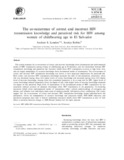Mostrar el registro sencillo del ítem
The co-occurrence of correct and incorrect HIV transmission knowledge and perceived risk for HIV among women of childbearing age in El Salvador
| dc.creator | London, Andrew S. | |
| dc.creator | Robles Soto, Arodys | |
| dc.date.accessioned | 2015-07-28T20:13:50Z | |
| dc.date.available | 2015-07-28T20:13:50Z | |
| dc.date.issued | 2000 | |
| dc.identifier.citation | http://www.sciencedirect.com/science/article/pii/S0277953600000447 | |
| dc.identifier.issn | 0277-9536 | |
| dc.identifier.uri | https://hdl.handle.net/10669/15140 | |
| dc.description | Artículo científico -- Universidad de Costa Rica, Instituto de Investigaciones en Salud. 2000. Este documento es privado debido a limitaciones de derechos de autor. | es_ES |
| dc.description.abstract | his article examines the co-occurrence of correct and incorrect knowledge about documented and undocumented modes of HIV transmission among women of childbearing age in El Salvador, and the relationship between HIV transmission knowledge and perceived risk. Incorrect beliefs about HIV transmission co-occur at high levels with, and are largely independent of, accurate knowledge about documented modes of transmission. The co-occurrence of correct and incorrect HIV transmission knowledge was shown to have important implications for perceived risk. Both correct and incorrect HIV transmission knowledge increased the odds of risk perception; uncertainty about risk was decreased among those with higher levels of correct knowledge and increased among those with higher levels of incorrect knowledge. Among those who considered themselves to be at some risk for HIV, higher levels of correct knowledge reduced uncertainty about the degree of risk, while higher levels of incorrect knowledge increased the degree of risk perceived. High levels of endorsement of the documented modes of HIV transmission do not necessarily indicate accurate or adequate knowledge about HIV transmission in the population. Co-occurring inaccurate beliefs about undocumented modes of transmission reflect cultural understandings of contagion and disease, and influence how individuals make sense of medical-scientific information about transmission. Our results suggest that the co-occurrence of correct and incorrect HIV transmission knowledge shapes individual-level risk perceptions. Given the independence of accurate knowledge and inaccurate beliefs, HIV/AIDS education and prevention programs must seek to directly undermine inaccurate beliefs about HIV transmission as part of their efforts to promote behavior change. | es_ES |
| dc.description.sponsorship | Universidad de Costa Rica, Instituto de Investigaciones en Salud | es_ES |
| dc.language.iso | en_US | es_ES |
| dc.source | Social Science & Medicine 51(8):1267-1278 | es_ES |
| dc.subject | HIV/AIDS | es_ES |
| dc.subject | El Salvador | es_ES |
| dc.subject | perceived risk | es_ES |
| dc.subject | Salud pública | es_ES |
| dc.subject | VIH/SIDA | es_ES |
| dc.title | The co-occurrence of correct and incorrect HIV transmission knowledge and perceived risk for HIV among women of childbearing age in El Salvador | es_ES |
| dc.type | artículo original | |
| dc.description.procedence | UCR::Vicerrectoría de Investigación::Unidades de Investigación::Ciencias de la Salud::Instituto de Investigaciones en Salud (INISA) | es_ES |


